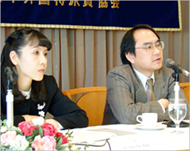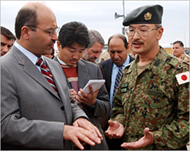Lawyers’ panel indicts Bush, Blair
US President George Bush and British Prime Minister Tony Blair deserve life sentences, with the possibility of parole after 25 years, for the war crimes and genocide in Iraq, according to a lawyers’ panel.

Speaking on Monday at the Foreign Correspondents’ Club of Japan, Kohki Abe, a professor of law at Kanagawa University, said they should face the “maximum penalty available”. That would not include the death penalty, however, as the members of the tribunal opposed capital punishment, he added.
Abe is the chief justice of a four-person panel of the International Criminal Tribunal for Iraq (ICTI) that has judged the two leaders guilty of a series of charges.
The tribunal has headquarters in Istanbul, Turkey, and a final meeting of regional panels is scheduled for June.
Numerous charges
In conjunction with similar legal movements around the world, the Japanese chapter of the tribunal was set up in July last year, bringing together more than 25 lawyers from around the world. More than 10,000 Japanese people have supported its work with financial donations.
 |
|
The international tribunal’s Japan |
Abe said: “The people’s tribunal does not have any binding force, and critics say that makes it useless because it doesn’t have any power.
“But I believe that delivering this judgment and giving a legal interpretation of the acts committed by the defendants shows that it is playing an important role.”
He added: “The tribunal has determined that injustices have been committed in Iraq and the tribunal is putting those injustices on the record.”
As well as the leaders of the United States and the United Kingdom, the ICTI has found Japanese Prime Minister Junichiro Koizumi and Gloria Arroyo, the president of the Philippines, guilty of numerous charges relating to their involvement in Iraq.
Non-binding ruling
The ICTI held a series of hearings to consider evidence and testimony before the four judges – two from Japan, a Korean and an Indonesian lawyer – and delivered its non-binding judgment on 5 March.
 |
|
Most Japanese strongly opposed |
The tribunal found Bush guilty on 13 counts, Blair guilty of eight crimes, Koizumi guilty on four counts and Arroyo guilty of aiding and abetting the other defendants of crimes of aggression and crimes against humanity, Abe said.
Bush is guilty of genocide for the use of “devastating” economic sanctions, as well as war crimes for attacks against civilians and the use of indiscriminate weapons, such as cluster bombs and depleted uranium weapons. The attack on Falluja also makes him guilty of genocide and crimes against humanity.
Guilty of genocide
Blair stands guilty on similar counts, Abe said, while Koizumi’s decision to support the US administration and provide refuelling capabilities, transportation facilities and home bases for US troops in Japan, as well as committing the Self Defence Forces, make him guilty of war crimes and genocide.
 |
|
Kohki Abe: We cannot let these |
“Japan says it is a ‘pacifist nation,’ but it is a key country for US operations and Mr Koizumi bears a strong responsibility for that,” Shin Hae Bong, a law professor at Aoyama Gakuin University and the Korean member of the panel, said.
“The Japanese government is tolerating the abuse of US bases on Japanese soil and gives them a free hand to use bases here to invade and occupy Iraq.”
Abe added: “I have to emphasise that these acts should have been prosecuted in other venues, such as the International Court for Justice, but for legal or political reasons these four defendants are unlikely to be prosecuted.
“The international civil society has set up these tribunals because we cannot let these acts go past without the criminals behind them being tried.”